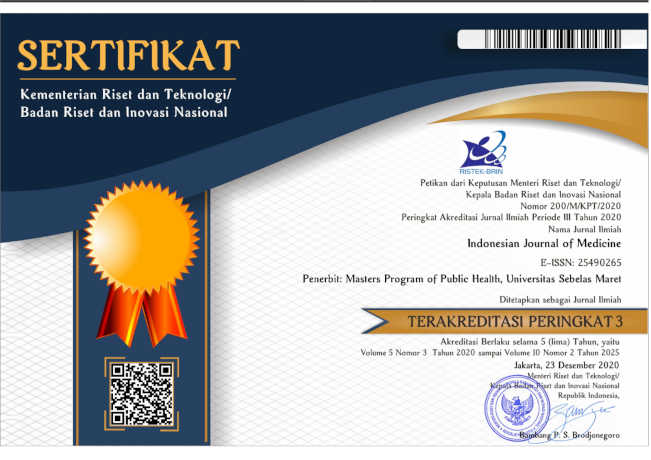The Relationship Between Parenting Style, Development Stimulation, and Gross Motoric and Language Ability in Children Under Five
DOI:
https://doi.org/10.26911/theijmed.2016.1.3.27Abstract
Background: Children progress through growth and development process according to age. Child growth and development are influenced by genetic and environmental factors during antenatal, intranatal, and postnatal periods. Child development is optimalized if there is social interaction that fulfill the need of the child at different stages of development. This study investigated the relationship between parenting style, development stimulation, and gross motoric and language ability in children under five in Grobogan, Central Java.
Subjects and Method: This was an analytic observational study with cross sectional design. This study was conducted in Toroh I Health Center, Grobogan sub-district, Central Java, from September, 17 to October, 17 2016. A total sample of 100 mothers and their children aged 1-5 years were selected for this study by cluster sampling. The dependent variable was gross motoric and language ability. The independent variables were parenting style and development stimulation. Gross motoric and language ability was measured by Denver II. Parenting style and development stimulation were collected by a set of questionnaire. The data were analyzed by multiple logistic regression.
Results: There were positive and statistically significant relationships between democratic parenting style (OR= 3.73; 95% CI=1.16 to 12.00; p=0.027), development stimulation (OR= 5.37; 95% CI=1.75 to 16.47; p= 0.003), and better gross motoric ability. There were positive and statistically significant relationships between democratic parenting style (OR= 3.50; 95% CI=1.18 to 10.35; p=0.023), development stimulation (OR= 3.49; 95% CI=1.24 to 9.84; p= 0.018), and better language ability.
Conclusion: Democratic parenting style and development stimulation are associated with both better gross motoric ability and better language ability.
Keywords: parenting style, development stimulation, gross motoric ability, language ability
Correspondence: Dhiyan Nany Wigati. An-Nur Midwifery Academy, Purwodadi, Central Java. Email: dhiyanwigati@gmail.com
Indonesian Journal of Medicine (2016), 1(3): 169-174
https://doi.org/10.26911/theijmed.2016.01.03.04
References
Ariani YM (2012). Usia anak dan pendidikan ibu sebagai faktor risiko gangguan perkembangan anak. Jurnal Kedokteran Brawijaya. 27: 118-121.
Asiyah S, Harjito K, Suwoyo (2010). Efektivitas metode stimulasi satu jam bersama ibu terhadap perkembangan anak usia 12-24 bulan. Jurnal Penelitian Kesehatan Suara Forikes. 1: 105-114.
Christi AY, Ramzi S, Irawan FK (2013). Hubungan Pengetahuan Ibu tentang Stimulasi Dini dengan Perkembangan Motorik pada Anak Usia 6-24 bulan di Kecamatan Mayang Kabupaten Jember. Jurnal Pustaka Kesehatan. 1(1): 20-23.
Cohen SE, Beckwith L, Parmelee AH (2012). Reseptive language development in preterm children as related to caregiver child interaction. Pediatrics. 20: 16-19.
Departemen Kesehatan RI (2009). Buku Kesehatan Ibu dan Anak. Cetakan I. Jakarta.
Dinkes Jateng (2015). Profil Kesehatan Provinsi Jawa Tengah Tahun 2015.
IDAI (2013). Mengenal keterlambatan perkembangan umum pada anak. http://www.idai.or.id/artikel/seputar kesehatan anak/mengenal keterlambatan perkembangan umum pada anak. Diakses pada tanggal 6 Juni 2016.
Kemenkes RI (2015). Sekretariat Jenderal Profil Kesehatan Indonesia Tahun 2014. Jakarta.
National Institute Of Child Health And Human Development (NICHD) (2006). Study of early child care and youth development (SECCYD).
Nursalam (2005). Asuhan Keperawatan Bayi dan Anak (untuk perawat dan bidan). Jakarta: Salemba Medika.
Pancsofar N, Vemon Feagans L (2006). Mother and father language input to young children: contributions to later language development. J App Dev Psy. 27: 571-587.
Sharma S, Nagar S (2009). Influence of home environment on psychomotor development of infants in Kangra district of Himachal Pradesh. J Soc Sci. 21 : 225-229.
Soetjiningsih (2013). Tumbuh Kembang Anak. Edisi 2. Jakarta: EGC.
Susanto A (2011). Perkembangan Anak Usia Dini, Pengantar dalam berbagai aspeknya. Jakarta: Kencana Prenada Media Group.
Wong DL, Chan RKW, Koh D, Tan HH, Lim FS, Emmanuel S, Bishop G (2008). Premarital Sexual Intercourse Among Adolescents in an Asian Country: multilevel Ecological Faktors Pediatrics.











